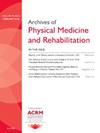新西兰奥特罗阿地区警察肌肉骨骼损伤后重返工作经历:现象学研究4348
IF 3.6
2区 医学
Q1 REHABILITATION
Archives of physical medicine and rehabilitation
Pub Date : 2025-04-01
DOI:10.1016/j.apmr.2025.01.026
引用次数: 0
摘要
目的调查新西兰奥特罗阿地区警察肌肉骨骼损伤后重返工作岗位的经历。使用了设计解释现象学分析,它借鉴了现象学,解释学和具象学,重点是从个人角度理解给定现象的意义。采用半结构化访谈,并采用解释现象学分析方法对数据进行分析。设置警务在奥特罗阿(新西兰)。参与者的资格标准是在选定地区因肌肉骨骼损伤暂时无法部署,并在过去6个月至5年内(截至2021年9月)完成了重返工作计划的可部署工作人员。使用有目的的抽样,招募有肌肉骨骼损伤后最近重返工作经验的官员。招募警察6名(男4名;2名女性;1名参与者:Māori;其余的被确定为新西兰欧洲。样本包括2个大型城市派出所、2个小型城市派出所和2个小型农村派出所的视角。InterventionsNot适用。主要结果测量使用解释性现象学分析过程来分析数据,并制定流程以确保整个分析过程的有效性和严谨性。结果从参与者的叙述中确定了4个主要主题:重返工作是一个谜,理解贫民窟,良好的康复看起来像重视人,以及质疑属于警察“家庭”。对访谈的分析显示,重返工作岗位对受伤警官的身份产生了深远的影响,部分原因是警察文化和康复过程带来的挑战。职业康复专家是康复领域的重要资源。警察组织内现有的不平等现象,例如对妇女的差别待遇和对文化需要的极少关注,因警察部门内部的复工进程而加剧。披露联安本文章由计算机程序翻译,如有差异,请以英文原文为准。
Police Officers’ Return to Work Experiences Following a Musculoskeletal Injury in Aotearoa New Zealand: A Phenomenological Study 4348
Objectives
To investigate the return to work experiences of police officers after a musculoskeletal injury in Aotearoa New Zealand.
Design
Interpretive Phenomenological Analysis was used, which draws on phenomenology, hermeneutics, and idiography with a focus on understanding meaning of a given phenomenon from the individuals perspective. Semistructured interviews were undertaken and data analyzed using Interpretive Phenomenological Analysis process.
Setting
Policing within Aotearoa (New Zealand).
Participants
Eligibility criteria were deployable staff who become temporarily undeployable due to a musculoskeletal injury within selected districts and has completed a return to work program within the last 6 months to 5-year period (as of September 2021). Purposive sampling was used, recruiting officers with a recent return to work experience after a musculoskeletal injury. Six police officers were recruited (men, 4; women, 2). One participant identified as Māori; the rest identified as NZ European. The sample included perspectives from 2 large urban police stations, 2 small urban police stations, and 2 small rural police stations.
Interventions
Not applicable.
Main Outcome Measures
The Interpretive Phenomenological Analysis process was used to analyze data and processes were in place to ensure validity and rigor throughout the analysis process.
Results
Results identified 4 main themes from participants accounts: Return to Work is a Mystery, Making Sense of the Ghetto, Good Rehabilitation Looks Like Valuing the Person, and Questioning Belonging to the Police “Family.”
Conclusions
Analysis of interviews revealed that being on a return to work program has a profound impact on injured officers’ identity, in part due to challenges arising from the police culture and rehabilitation processes. Expert vocational rehabilitation practitioners are an important resource in the rehabilitation context. Existing inequalities within the police organization, such as differential treatment of women and minimal attention to cultural needs, are exacerbated by the internal return to work process of the police service.
Disclosures
Liané de Klerk has previously provided rehabilitation services to the selected districts, and 3 of the 6 participants were known to Liané. Potential conflict of interest was disclosed in the Participant Information Sheet, noting that participation would have no impact on future treatment. Liané was not providing active treatment to any of the participants and was exiting clinical practice. Robin Griffiths has previously worked at the Police College, which was made explicit in the study invitation. Robin was not directly involved in any of the interviews with participants. Fiona Graham has no conflicts of interest to disclose.
求助全文
通过发布文献求助,成功后即可免费获取论文全文。
去求助
来源期刊
CiteScore
6.20
自引率
4.70%
发文量
495
审稿时长
38 days
期刊介绍:
The Archives of Physical Medicine and Rehabilitation publishes original, peer-reviewed research and clinical reports on important trends and developments in physical medicine and rehabilitation and related fields. This international journal brings researchers and clinicians authoritative information on the therapeutic utilization of physical, behavioral and pharmaceutical agents in providing comprehensive care for individuals with chronic illness and disabilities.
Archives began publication in 1920, publishes monthly, and is the official journal of the American Congress of Rehabilitation Medicine. Its papers are cited more often than any other rehabilitation journal.

 求助内容:
求助内容: 应助结果提醒方式:
应助结果提醒方式:


